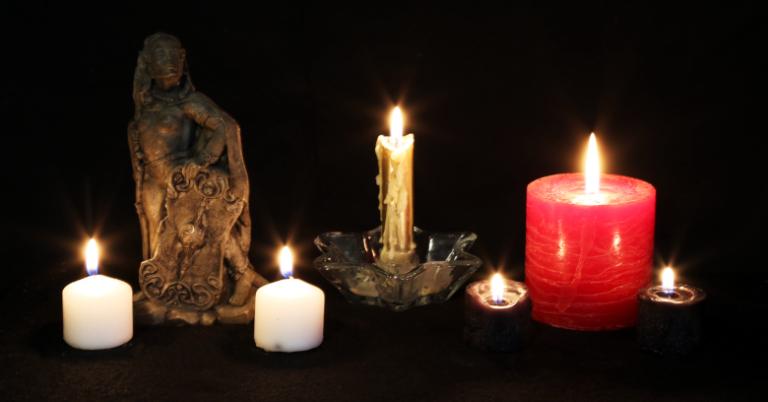Our Conversations Under the Oaks continue. James Russell Broach asked:
What do you do when a God’s values and yours don’t align? For example, a MAGA Pagan finding their God is for the far left, or a leftist Pagan being told by their God to support MAGA.
Someone who prefers to remain anonymous asked a similar question:
What do you do if a God requires animal sacrifice?
I want to answer this question directly, then dive into some important details. And the direct answer is this:
You are always responsible for your own life and your own decisions. “A God told me to do it” is no more justification for doing something you know – or strongly suspect – is unethical than “I was only following orders” was 78 years ago. Live up to your own ethics and virtues no matter who tries to get you to do something else.
The Gods are virtuous and this is not common
Both questions were stated as hypotheticals. There’s a good reason for that – this situation is not common. It’s never happened to me. I’ve never heard of it happening to any of my close friends or co-religionists.
What makes a God a God? What differentiates a God from a spirit who is very powerful but not divine? That question is a mystery that is at least partially beyond the capacity of humans to fully understand, but one thing I’m sure of is that the Gods are always virtuous. Now, their ways are not our ways and their ethics aren’t always our ethics. “Virtuous” doesn’t mean “nice.”
More importantly, our ethics may not be perfectly developed – what we think are ethical requirements may be nothing more than personal preferences. That doesn’t mean they’re wrong – although it may. It does mean that if a God we know and trust asks us to do something seemingly in conflict with our ethics, we need to take another look before we say no.
More often: demanding you get out of your comfort zone
What I do see fairly regularly is a God asking people to do something they really don’t want to do. Not because it’s unethical, but because it’s difficult, unpleasant, or dangerous. The Morrigan is famous for this – if you serve a Battle Goddess, expect to see combat (mostly metaphorical combat, but not always).
Sometimes we’re asked to do something unpleasant because we need to learn and grow. But more often, a God says “go do this!” because “this” needs to be done, for reasons we don’t fully understand. I trust the Morrigan because in all my years of serving Her, She’s never asked me to do anything that didn’t need to be done. Sometimes it was for my benefit – other times it was for the benefit of someone else. Always it was in service of Her values and the promotion of Her virtues.
And I’m always willing to do that.
Mindless obedience is not a virtue
Implicit in this question is the idea that the Gods are authorities and authorities must always be obeyed. This is hierarchical thinking. This is the Roman Empire filtered through militant Christian culture.
In the middle of a battle, hierarchy and obedience are necessary – there is no time for discussion and debate. Outside of that urgency, though, this simply reinforces a culture that values and privileges some over others because of wealth, power, or accident of birth.
We owe our Gods our respect and devotion, because They are good and because They provide blessings on our world and on our lives. We owe Them the presumption of good intentions, because our experiences show that there are usually good reasons for what they ask, even if we can’t see them in the moment.
We do not owe Them our unreflective obedience, and in my experience, They rarely if ever request it.
We are not Gods, but we are sentient beings with the capacity for reason and compassion. We are responsible for our own lives, and we do that best when we live according to the ethical principles that our traditions and our own experiences teach are good and helpful.
We can’t delegate that responsibility to others, not even to our Gods.
The idea that what a God wants must be good is Calvinism
Calvinist Christians argue that we must obey, because we are incapable of knowing what is good or bad unless an authority tells us. Now, we can and should debate ethics and virtues – this is one of the functions of the discipline of philosophy. But ultimately, each of us not only can but must decide what is good or bad. Otherwise we’re pleading “I was just following orders” again.
Calvinists take this even further. They argue that if their God wants to cast billions of people into eternal torment, that is by definition good and we should praise him for it.
Christianity doesn’t need a devil – it already has John Calvin.
Good stands on its own. It may be complicated, convoluted, and unpleasant. It may be difficult to determine. But if something is good, it is inherently good on its own and not simply because a God says it’s good.
The Gods don’t seem to care much about political parties
The “MAGA vs. leftist” situations were presented as hypotheticals, but I feel the need to address them directly.
In my experience, the Gods show very little interest in human politics. They promote virtues, not parties.
The cliché says people get more conservative as they get older, but the older I get the closer I move toward socialism. I’ve seen too much of the world and how it works – ruthlessly and callously. I want high taxes supporting high services and a high social safety net. But is this inherently and objectively better than a more laissez faire society? I can’t say that it is.
I can say that the MAGA worship of Donald Trump is cultish and evil.
More than that, when I ask the Morrigan or Cernunnos or Brighid about political matters, what I hear is “do your work” and “put your trust in us, not in governments.” This was part of Denton CUUPS’ 2017 Beltane ritual. I led it, but I didn’t write these lines. They came straight from Cernunnos and the Morrigan in an experience I remember as clearly as if it was earlier today.
You think government is strong? Nature is stronger. You think politics is strong? The human spirit is stronger. You think the law is strong? Magic is stronger.
Who can stand against us when we align ourselves with the currents of Nature? Who can stand against us when we ally ourselves with our Good Neighbors in honor and respect? Who can stand against us when rank upon rank of mighty ancestors surround us? And who can stand against us when we ally ourselves with the Gods?
Be an engaged citizen – it’s our duty. But don’t put your hope in politics and politicians.
A word on animal sacrifice
The question about animal sacrifice was also given as a hypothetical. This comes up periodically. It was something many of our ancestors did, and some contemporary polytheists wonder if we should do it now.
I wrote about this in depth in a 2014 post titled Sacrifice and the Fear of Real Gods. If you have any strong feelings on this practice – positive or negative – I encourage you to read it in its entirety. I’ll say this much here:
The bulk of the arguments against animal sacrifice don’t come from vegetarians and vegans. They come from omnivores having a gut level reaction against a practice they’ve been told is primitive, barbaric, and unnecessary. This is cultural prejudice.
I know a few polytheists who practice animal sacrifice. All of them raise their own animals. Those animals’ lives are far better and their deaths are far cleaner than the lives and deaths of the animals that provide your hamburgers and fried chicken.
If you feel called to make animal sacrifices, learn to do it right or don’t do it at all.
And if you feel called to do this but genuinely believe it’s unethical, don’t do it.
Listen carefully, contemplate mindfully, decide wisely
Our Gods are virtuous and They rarely ask us to do things that would violate our ethics. They often ask us to do things that are uncomfortable, difficult, or dangerous. We need to learn to tell the difference.
If you feel like a God is asking you to violate your ethics, make sure you’re hearing Them correctly. Work through a discernment process – use divination if necessary.
If you are hearing Them correctly, take another look at your ethics. Are they truly the best way to live, or are they what you’ve always been told you’re supposed to do? Or are they just what you prefer?
Paganism (or Paganisms, if you prefer) is a religion of virtues, not a religion of rules. Determining the right thing to do – and the wrong thing to not do – is often complicated. Sometimes we find ourselves in a dilemma where there are no good choices and all we can do is choose what’s least worst.
And refusing to choose is itself a choice, as we are reminded at every election.
At the end of the day – and at the end of our lives – we are responsible for our own choices. We are human – we will not be perfect.
But we can listen, contemplate, and then decide, like the free and sovereign people we are.




















